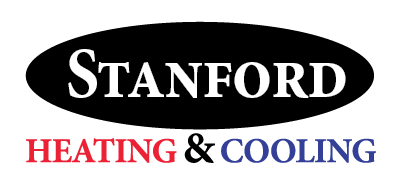
If you’re in the market for an air purifier, you may be realizing that some manufacturers are producing many claims. And most of those claims may seem too good to be true. So, it’s only expected that you may be wondering are air purifiers a waste of money.
They’re useful, according to the EPA, because they’re a fantastic approach to better your Bloomfield house’s indoor air quality. Modern houses are tightly sealed and thoroughly insulated, which is fantastic for energy efficiency, but not so good for indoor air quality.
As updated residences don’t typically allow in as much outdoor air as older homes, contaminants like dust, pet dander and cleaning products can build up in your home. The consequence? Air that’s dirtier than the outdoors, which is not good if you have allergies, asthma or are susceptible to respiratory irritation.
Our indoor air quality professionals at Stanford Heating & Cooling can help you cut through the clutter and find the best home air purifier. Just give us a call at 812-825-8695 and we’ll be happy to provide support. Meanwhile, find out more about how air purifiers work, their perks and our advice to help you choose the ideal air purifier.
How Does an Air Purification System Work?
Most home air purifiers use a fan to draw in air. Then, the air is pushed through one or more filters to collect irritants before being redistributed.
These filters can have a charcoal filter, to eliminate odors, and a HEPA, or high efficiency particulate air, filter. A HEPA filter is at least 99.7% effective at capturing tiny particles as little as .3 microns, including dust, pollen, mold and some bacteria.
An air purifier can be lightweight and used to purify an individual area. Or they can be fitted to your HVAC system, delivering effective filtration for your entire house.
The EPA says you should know that air purifiers can’t get rid of 100% of the contaminants from your house’s air. But when used in combination with a better filter for your HVAC system, they can significantly decrease the concentration of indoor air pollution.
4 Advantages of Air Purification
Adding an air purifier to your home can offer lots of outstanding health advantages. Here are just a couple of them.
1. Reduces Allergy and Asthma Triggers
Air purifiers lower pollutants in your house, such as some of these common triggers:
- Dust
- Pollen
- Mold
- Volatile organic compounds, including cleaners, air fresheners and personal care products
2. Lowers Other Issues Associated with Poor Indoor Air Quality
Even if you or someone in your household doesn’t struggle with allergies or asthma, an air purifier can alleviate other troubles linked to poor indoor air quality. These entail:
- Dry throat, eyes, nose or skin
- Headaches
- Sneezing and coughing
- Fatigue
- Dizziness
- Nausea
It can be tricky to distinguish troubles associated with indoor air quality, because they can be caused by many other illnesses. However, if you’re noticing that symptoms are better after you leave your house, your indoor air quality is likely causing a problem.
3. Removes Odors
Lingering odors, including cigarette smoke or cooking smells, can be difficult to eliminate. If you are having a hard time with removing heavy smells in your residence, our professionals advise purchasing an air purifier with a charcoal or activated carbon filter.
4. Might Decrease Your Likelihood of Becoming Sick
An air purifier can eliminate some bacteria and viruses under certain airflow conditions, keeping you and your loved ones in better health particularly during cold months. To take complete advantage of this plus, our pros recommend a UV air purifier. Disinfecting ultraviolet light delivers an additional layer of protection against airborne pathogens.
Air Purifiers to Skip
You’re better off without certain air purifiers. Here are a few features to stay away from when choosing a system for your home:
- Creates ozone. Some air purifiers create ozone, which can bother your lungs. The EPA recommends skipping ozone air purifiers.
- Doesn’t include HEPA filters. For the best filtration, you’ll want a HEPA air purifier. Known as the gold standard for healthy air, HEPA filters are used in the majority of healthcare settings, such as hospitals.
- Only purifies a single room. We suggest installing a whole-house air purifier, which purifies the air in every room. This solution runs with your HVAC system.
When you partner with the indoor air quality specialists at Stanford Heating & Cooling, we make it uncomplicated to buy the best air purifier for your home. Reach us at 812-825-8695 to get started breathing healthier air now!

